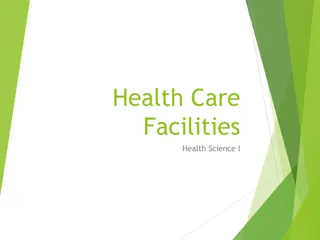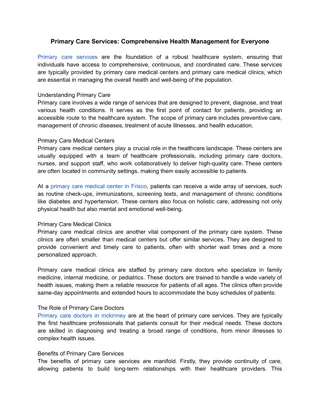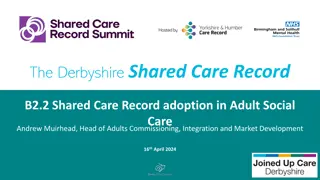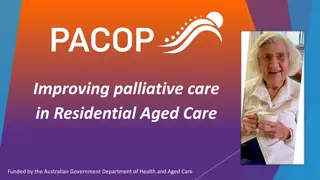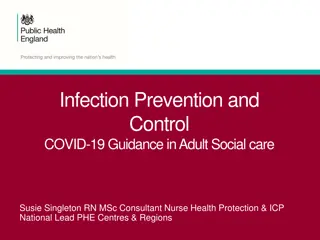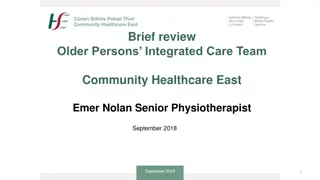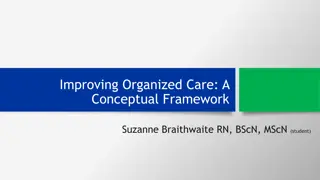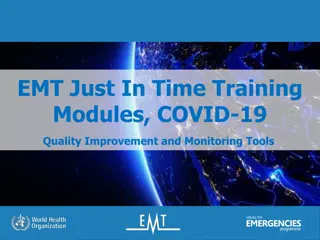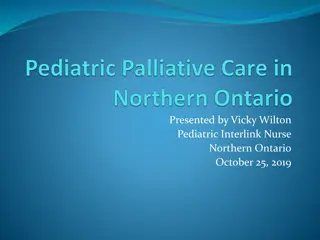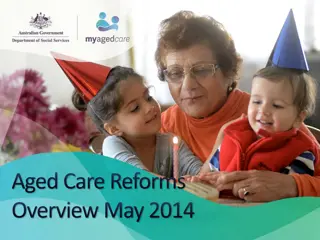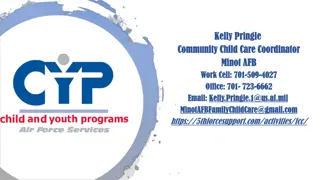
Key Aspects of Care for Unconscious Adult Patients in the ICU
Providing specialized care for unconscious adult patients in the Intensive Care Unit (ICU) is crucial for ensuring their safety, maintaining vital functions, preventing complications, and supporting recovery. This comprehensive guide covers continuous monitoring, airway management, sedation, nutrition, preventing complications, infection control, skin care, neurological assessment, family communication, and rehabilitation. Individualized care is essential in the ICU, involving a collaborative multidisciplinary approach to meet the patient's specific medical needs.
Uploaded on | 2 Views
Download Presentation

Please find below an Image/Link to download the presentation.
The content on the website is provided AS IS for your information and personal use only. It may not be sold, licensed, or shared on other websites without obtaining consent from the author. If you encounter any issues during the download, it is possible that the publisher has removed the file from their server.
You are allowed to download the files provided on this website for personal or commercial use, subject to the condition that they are used lawfully. All files are the property of their respective owners.
The content on the website is provided AS IS for your information and personal use only. It may not be sold, licensed, or shared on other websites without obtaining consent from the author.
E N D
Presentation Transcript
CARE OF UNCONCIOUS ADULTS & PEDIATRICS SUJATA WALODE, TUTOR, MGM SBSA
CARE OF UNCONCIOUS ADULTS Caring for unconscious adult patients in the Intensive Care Unit (ICU) requires specialized knowledge, skills, and a multidisciplinary approach. The primary goals of care for unconscious patients in the ICU are to ensure their safety, maintain vital functions, prevent complications, and provide support for their recovery. Here are some important aspects of care for unconscious adult patients in the ICU: Continuous Monitoring: Unconscious patients require continuous monitoring of vital signs, including heart rate, blood pressure, respiratory rate, and oxygen saturation. Monitoring brain function, usually through intracranial pressure monitoring or EEG (electroencephalogram), may also be necessary for certain patients. Airway Management: Maintaining a clear and patent airway is crucial to ensure adequate oxygenation and ventilation. Patients may require intubation and mechanical ventilation to support their breathing. The endotracheal tube should be appropriately secured, and its position and function regularly assessed. Sedation and Analgesia: Unconscious patients may require sedation and analgesia to keep them comfortable and prevent agitation or pain. These medications should be titrated carefully to achieve the desired level of sedation while minimizing the risk of adverse effects.
CARE OF UNCONCIOUS ADULTS Nutrition and Hydration: Providing proper nutrition and hydration is essential for the patient's recovery. Depending on their condition, nutrition may be delivered through enteral feeding or intravenous (IV) fluids. Prevention of Complications: Unconscious patients are at risk of various complications, including pressure ulcers, deep vein thrombosis (DVT), and infections. Frequent repositioning, use of pressure-relieving devices, and appropriate anticoagulant prophylaxis can help prevent these complications. Infection Control: Strict infection control measures should be followed to minimize the risk of healthcare-associated infections, especially considering the vulnerability of unconscious patients.
CARE OF UNCONCIOUS ADULTS Skin Care: Careful attention to skin integrity is crucial. Regular assessment and gentle cleaning of the skin can help prevent skin breakdown. Neurological Assessment: Regular neurological assessments are conducted to monitor changes in the patient's level of consciousness and neurologic status. This may involve the Glasgow Coma Scale (GCS) or other specific assessments. Family Communication and Support: Communication with the patient's family is essential to keep them informed about the patient's condition, treatment plan, and progress. Providing emotional support to the family during this challenging time is crucial. Rehabilitation: Depending on the cause of unconsciousness, rehabilitation interventions may be initiated early to prevent complications related to immobility and to facilitate recovery once the patient regains consciousness.
CARE OF UNCONCIOUS ADULTS It's important to note that the care of unconscious patients in the ICU is highly individualized based on the patient's specific medical condition, underlying cause of unconsciousness, and response to treatment. A collaborative and multidisciplinary approach, involving intensivists, nurses, respiratory therapists, physiotherapists, and other healthcare professionals, is necessary to provide comprehensive and high-quality care to these critically ill patients.
CARE OF UNCONCIOUS PEDIATRICS Caring for unconscious pediatric patients in the Intensive Care Unit (ICU) requires specialized skills, knowledge, and a compassionate approach. Pediatric patients have unique physiological and developmental considerations that must be taken into account when providing care. Here are some important aspects of care for unconscious pediatric patients in the ICU: Continuous Monitoring: Unconscious pediatric patients require continuous monitoring of vital signs, including heart rate, blood pressure, respiratory rate, oxygen saturation, and temperature. Additional monitoring, such as capnography (measuring exhaled carbon dioxide), may also be necessary. Airway Management: Maintaining a clear and patent airway is critical for unconscious pediatric patients. Depending on the severity of respiratory compromise, airway support may include bag- mask ventilation, intubation, or even the use of advanced airway techniques like continuous positive airway pressure (CPAP) or high-flow nasal cannula (HFNC). Sedation and Pain Management: Pediatric patients in the ICU may require sedation and analgesia to keep them comfortable, prevent agitation, and manage pain. Careful assessment and individualized dosing are essential to avoid adverse effects and achieve the desired level of sedation
CARE OF UNCONCIOUS PEDIATRICS Nutrition and Hydration: Providing appropriate nutrition and hydration is vital for the pediatric patient's recovery. Nutritional support may be delivered through enteral feeding or intravenous (IV) fluids, depending on the patient's condition. Preventing Complications: Unconscious pediatric patients are at risk of various complications, including pressure ulcers, infections, and immobility-related issues. Regular repositioning, skin care, and early mobilization (when appropriate) are essential to minimize these risks. Family-Centered Care: Involving and supporting the family in the care of the unconscious pediatric patient is crucial. Regular communication with the family to provide updates on the patient's condition, treatment plan, and progress is essential for reducing anxiety and promoting trust.
CARE OF UNCONCIOUS PEDIATRICS Neurological Assessment: Regular neurological assessments, tailored to the child's age and developmental stage, are performed to monitor changes in the level of consciousness and neurological status. Infection Control: Strict infection control measures should be followed to prevent healthcare- associated infections and protect the pediatric patient from potential complications. Developmentally Appropriate Care: Care should be tailored to the child's developmental stage, considering their emotional and psychological needs. Play therapy and distraction techniques may be used to alleviate fear and anxiety. Rehabilitation: Depending on the cause of unconsciousness, early initiation of rehabilitation interventions may be important to prevent complications related to immobility and to facilitate recovery once the child regains consciousness. Caring for unconscious pediatric patients requires a multidisciplinary approach, involving pediatric intensivists, pediatric nurses, respiratory therapists, child life specialists, and other healthcare professionals. The care provided should be family-centered, compassionate, and focused on supporting the child's recovery and overall well-being.



